'If you don't have a strong political leadership, however much expertise a country may have, in pandemic preparedness or infectious disease, will not matter.'
'It's really about having strong political leadership, that is proactive, that prioritises taking the right action.'
'And if you don't have that, then you will have a much worse pandemic experience.'
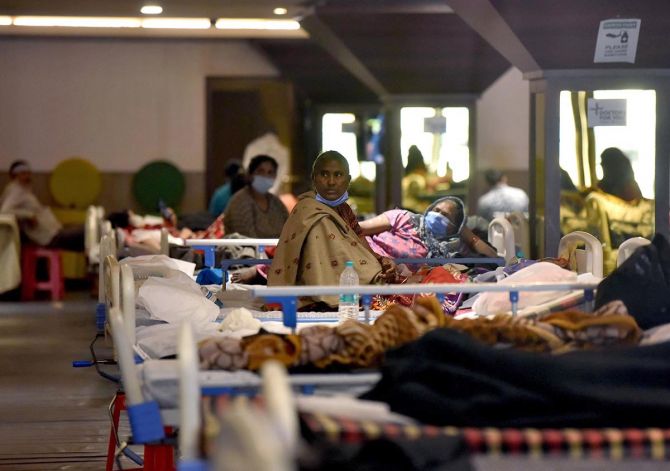
There must be an endgame for COVID-19.
That's something we have been wearily, dismayingly wondering about since last March.
We have pondered, without end, over when this virus, that has overwhelmingly dominated our lives for 16 months, will finally be neutralised.
Infectious disease and public health expert Dr Amesh Adalja believes COVID-19 will be with us, in its present more aggressive avatar, till 2022.
Dr Adalja, an infectious disease specialist, practices in the Pittsburgh area of Pennsylvania. He is also a senior scholar at the Johns Hopkins Center for Health Security and adjunct assistant professor at the Johns Hopkins Bloomberg School of Public Health, attached to the Johns Hopkins Center for Global Health.
In Part I of his interview to Vaihayasi Pande Daniel/Rediff.com, he underlined the importance of not judging the COVID-19 vaccines and being too pernickety about their efficacy stats and numbers and instead focus energy on getting a shot, whichever brand.
Dr Adalja discusses re-vaccination, the meaning of long-haul symptoms of COVID-19 and what is still frustratingly unfathomable about the virus.
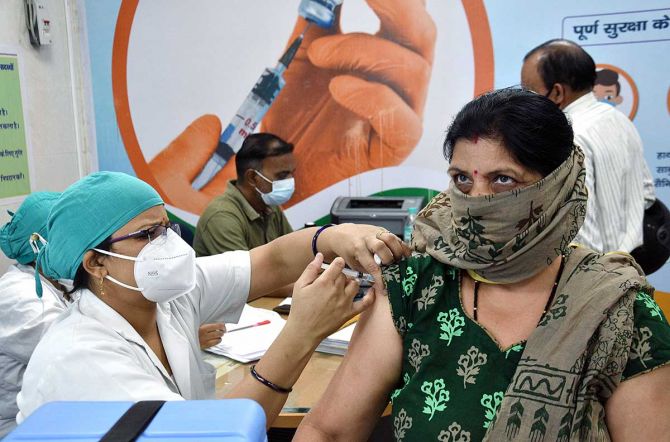
As an infectious disease and emergency care physician, who also works on pandemic preparedness, what does the end game look like? Microsoft founder, Bill Gates was talking about 2022. But there are so many variants?
For the world, I think, the endgame is going to be 2022. For some of the developed countries in the world, like the United States, I think, we will probably get to some semblance of normalcy by mid-summer of 2021.
We are not going to get to COVID-Zero. What we will do is vaccinate the vulnerable populations in the world, so that COVID-19 is not something that can cause a public health emergency any longer and that its ability to cause serious disease, hospitalisation and death on a wide scale is removed through the vaccine. I think that's the endgame.
But for the world to get there, it's likely to be well into 2022.
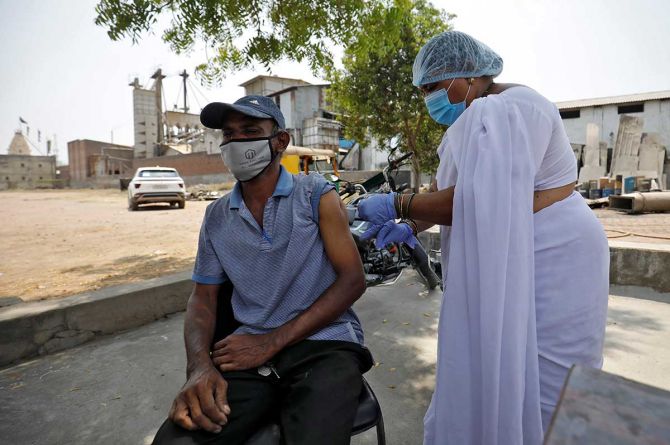
I understand that variants don't always get more virulent. But can a more virulent variant just change the whole scene and we'll be looking at revaccination or something like that?
If you look at the variants, the more concerning of the variants, like the South African and Brazilian variant: The vaccines are still highly effective at stopping what matters. The vaccines stop the ability of these variants to cause serious illness, hospitalisation and death.
That to me is all that matters -- even in the face of these troublesome variants, the vaccines do what they are designed to do.
Whether or not we need to update vaccines to cover variants, I don't think we've crossed that threshold yet. If we see people, who are vaccinated, getting breakthrough infections with a variant, that lands them in a hospital, that's a different story.
But we're not really seeing that right now. With the variants that are out there right now, priority needs to be getting the vaccine into people's arm.
If we need to update the vaccine for variants, I think that comes later down the road.
But I don't think, right now, we're across that threshold, where the variants are able to cause serious disease in a hospitalised person and to me that's what matters.
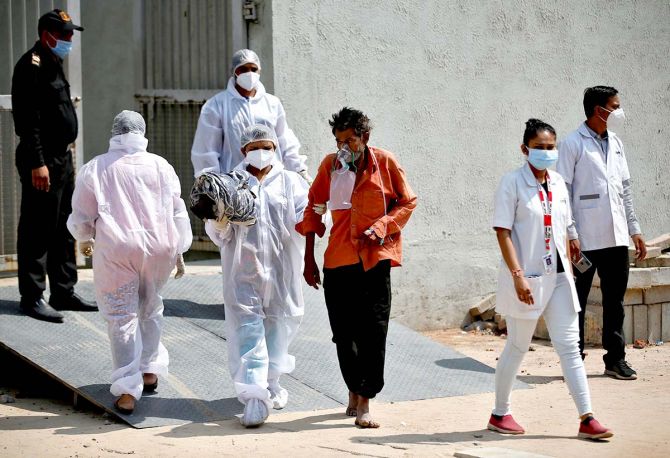
In your view, what are the best personal protection COVID-19 practices, even as we're getting the vaccine, but everybody hasn't got it yet? Is anything different on this front from last year?
The number one thing is to get vaccinated. When it is your turn to get vaccinated, go get vaccinated! That's the best way to protect yourself against COVID-19.
The others are: Wear a face covering when you cannot social distance, wash your hands a lot and avoid crowded and congregated places.
You just have to remember that the virus is out there, and it's going to be with you with every activity that you partake in. Make very good risk calculations when you're out there doing things -- like wearing a mask, trying to avoid the most crowded places and washing your hands a lot.
And staying home if you are sick, and getting tested as frequently as necessary.
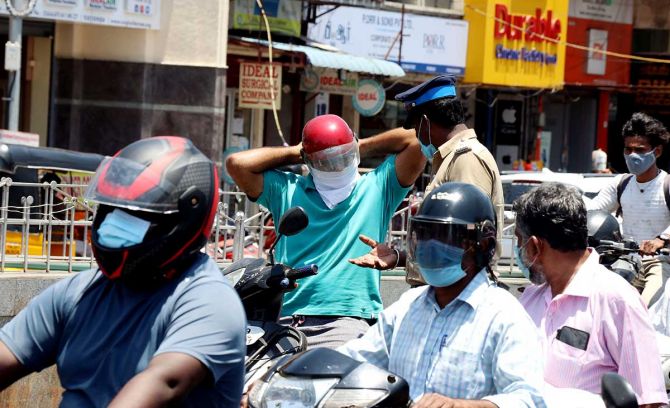
Do you recommend a double mask?
If you have an adequate mask, I don't think you necessarily need to have a double mask.
If you've got a well-fitted, multi-layered mask, I don't think you need to wear a double mask. However, if you're wearing a bandana, or something that is flimsy, that doesn't fit well, then I do think double masking has a role. But not for everybody, it's only when you have an inadequate mask.
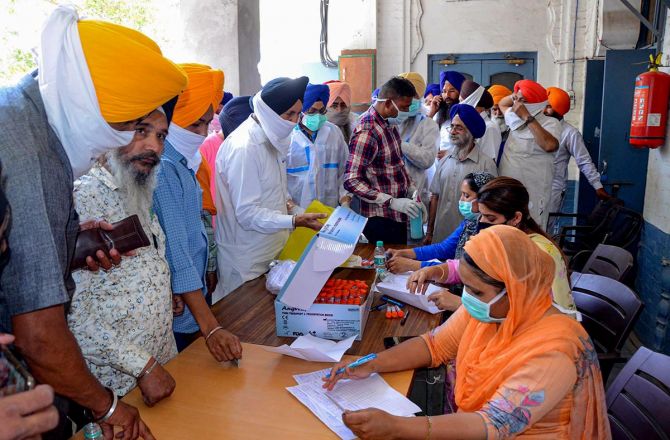
My younger daughter had this query: If you're quarantining/isolating, because you've had some exposure, or you travelled, you need to do so for 14 days. If you develop COVID-19 on the 12th-13th day, but are asymptomatic, then when you cross the 14th day, are you contagious and can you spread the disease?
First of all, the quarantine in the United States is 10 days, or seven days if you have a negative test on Day 5. It's a little bit different in different countries.
So, I tell people, if you're exposed, you need to be quarantined for 10 days, or quarantined for seven days, but get a test on Day 5. And if it's negative, and then your quarantine ends Day 7.
To your daughter's question: How did the person know they got COVID-19 if they're asymptomatic? How did they know they developed COVID-19 on Day 13?
Well, you don't. So therefore, you would still have it and since your quarantine has ended, you could be spreading it? Or maybe you're not contagious?
First of all, the quarantine period is 10 days. So, it doesn't really matter what happens on Day 13. The quarantine period in the United States is 10 days.
Well then let's say the ninth day?
Yes, so it's very unlikely that you develop COVID-19 on Day 9 and it's asymptomatic. If you develop symptoms of COVID-19, during your quarantine period, you should be tested. And you should isolate, until you get that test result back.
Most people who get sick with COVID-19 or develop COVID-19 post exposure, it occurs within the first seven days. It becomes increasingly unlikely, especially if you've had a test on Day 5, for example, that you're going to develop COVID-19 on Day 9
It's extremely less likely that you develop it. It's just the majority of cases occur before Day 7.
That's why in the United States, we shortened the quarantine period from 14 to 10, based on epidemiological data, when people were getting symptoms.
If you develop symptoms, yes, you're going to be contagious. But I think that the likelihood that someone is a contagious person that far into their quarantine period, becomes very small.
It's not zero, but it is small.
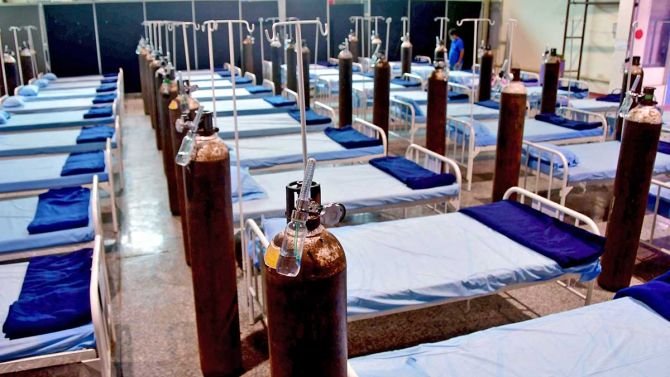
One observes that people are constantly suffering differently with COVID-19, even within one family, and not predictably, when this virus strikes, whatever the variant. Are there any better answers or better information on why it's just so different, individual to individual?
It has to do with individual risk factors.
Some people may have underlying illness and that puts them at higher risk for severe disease.
Some people might get exposed to a higher viral inoculum; they get they get hit with a lot more virus.
And there are probably idiosyncratic genetic immunological differences, between people, that play a role in how severe the infection is.
We're seeing a lot of distressing long-haul symptoms in India too? What do you have to say about the long-haul cases?
We know they occur.
I think, right now, they're poorly defined, because there's a lot of different things that get grouped together under long haul.
The biggest challenge right now is developing good diagnostic criteria. Because not everything is probably the same, that gets labeled long haul.
What we really have to focus on are those symptoms that interfere with a person's activities of daily living, because there are some people who just have loss of taste and smell for some time. And that's less concerning than someone who cannot concentrate, or someone who cannot walk up the stairs anymore.
We also have to separate people who've had severe disease and have been in the intensive care unit. That's a separate issue. There is a well-defined entity called post-ICU syndrome*. And that's a little bit different from these long-haul symptoms.
The biggest thing that's going on here: We've got to come up with a universal definition of what falls under long haul, and then study those patients systematically, to understand why this is occurring. And what is the cause? What are the risk factors?
We're only kind of scratching the surface of understanding long haul at this point. We will be able to refine the definition and understand more about what's actually going on from a physiology standpoint.
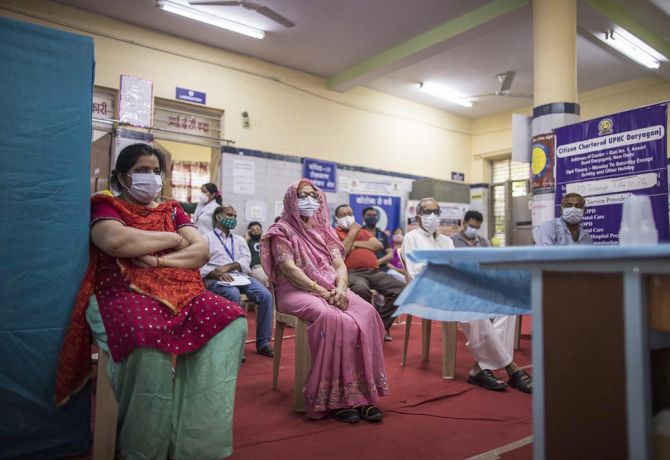
In the Vox.com feature on vaccines, you spoke about how vaccines are extremely important, not because they will necessarily bring a COVID-Zero situation, but it's about defanging the virus. The most important thing about the vaccine is bringing about a sort of artificial herd immunity by making sure as many people around you are vaccinated?
I wouldn't say it that way.
I would say the most important thing about the COVID-19 vaccine is that they removed the ability of the virus to cause serious disease, hospitalisation or death.
It makes it a much more manageable respiratory virus -- one that can no longer threaten hospital capacity, one that is no longer a public health emergency. And it becomes more like the respiratory viruses that we deal with year in and year out.
That's what the COVID-19 vaccines do. That's what they're designed to do. That's why they were developed. They do an excellent job of that.
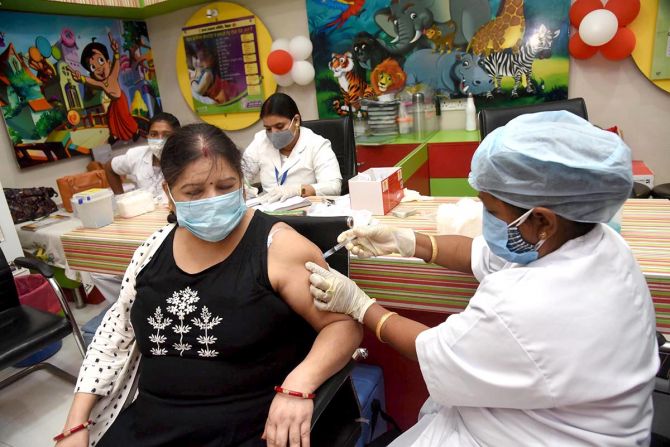
What have you learned dealing with COVID-19? And how different has experience been for you? And what is still sort of puzzling about this virus for you?
From my perspective, I learnt that pandemic response is going to be highly dependent upon political leadership.
If you do not have a strong political leadership, however much expertise a country may have, in pandemic preparedness or infectious disease, will not matter.
It's really about having strong political leadership, that is proactive, that prioritises taking the right action. And if you don't have that, then you will have a much worse pandemic experience than you would have with another type of leadership structure.
So just comparing the United States with Taiwan, for example, is a good way to concretise that.
I think there are still puzzles about how do you determine who's going to have a severe case, who is going to have a mild case of COVID-19. That's still puzzling.
We still don't understand the ultimate origin of this virus -- how it went from bats to humans, what intermediate animal was involved. That's also very puzzling to me to understand and help us for the next pandemic, and to prepare for other coronaviruses.
Those are the two things: Understanding who gets severe versus mild disease and then the ultimate origin of the virus.
 IMAGE: Dr Amesh Adalja. Photograph: Kind courtesy Dr Amesh Adalja
IMAGE: Dr Amesh Adalja. Photograph: Kind courtesy Dr Amesh AdaljaEverybody talks about another pandemic, another virus. One of your areas of expertise is pandemic preparedness. Is there nothing that one can do as an individual citizen?
No, there is.
They can talk to their politicians and political leaders to make sure that public health is prioritised, that programmes that work on infectious disease emergencies are adequately funded, that public health agencies have resources. They can do that. They can talk to their elected officials.
That is a kind of a worry that we all have to think about -- the next pandemic?
Yes.
I would just say that the severity of this pandemic is a direct result of failures of governments. So, I do think that that's something that people can do.
How did it personally affect you?
That is all I do all day.
Anything else?
No, it's all I do all day long.
* According to www.medicalnewstoday.com: 'Post-intensive care syndrome or PICS refers to a group of health impairments that can occur after a person survives a life-threatening condition. It can cause physical, cognitive, and mental health conditions'.
Feature Presentation: Ashish Narsale/Rediff.com












 © 2025
© 2025